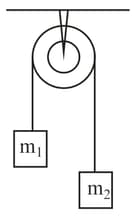Two blocks of masses and are connected by a string as shown in Figure given below over a frictionless pulley of negligible mass. What is the acceleration magnitude of the two-block system if ?
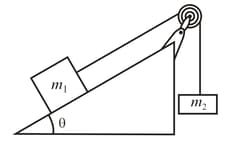
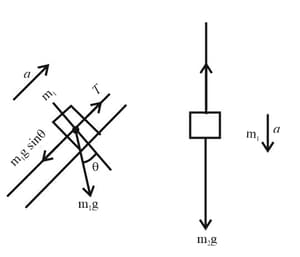



Important Questions on Force and Motion-I
In the figure shown below a man sitting in a bosun's chair that dangles from a massless rope, which runs over a massless, frictionless pulley and back down to the man's hand. The combined mass of man and chair is. With what force magnitude must the man pull on the rope if he is to rise (a) with a constant velocity and (b) with an upward acceleration of ? (Hint: A free-body diagram can really help.) If the rope on the right extends to the ground and is pulled by a co-worker, with what force magnitude must the co-worker pull for the man to rise (c) with a constant velocity and (d) with an upward acceleration of? What is the magnitude of the force on the ceiling from the pulley system in (e) part a, (f ) part b, (g) part c, and (h) part d?
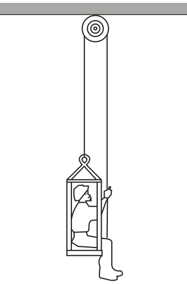
A Monkey climbs up a massless rope that runs over a frictionless tree limb and back down to a package on the ground in the figure shown below.
What is the magnitude of the least acceleration the monkey must have if it is to lift the package off the ground?
If, after the package has been lifted, the monkey stops its climb and holds on to the rope, what are the magnitude and direction of the monkey's acceleration and the tension in the rope?
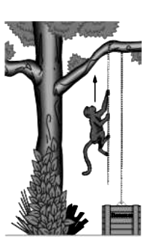
In the figure shown below a block being pulled along a frictionless floor by a cord that applies a force of constant magnitude but with an angle that varies with time. When angle , at what rate is the acceleration of the block changing if
and
?
(Hint: The angle should be in .)
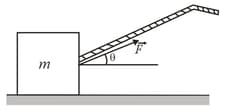
In the shot put, many athletes elect to launch the shot at an angle that is smaller than the theoretical one (about ) at which the distance of a projected ball at the same speed and height is greatest. One reason has to do with the speed the athlete can give the shot during the acceleration phase of the throw. Assume that a shot is accelerated along a straight path of length by a constant applied force of magnitude , starting with an initial speed of (due to the athlete’s preliminary motion). What is the shot's speed at the end of the acceleration phase if the angle between the path and the horizontal is and ? (Hint: Treat the motion as though it were along a ramp at the given angle.)
By what percentage is the launch speed decreased if the athlete increases the angle from to ?
In the figure shown below gives, as a function of time , the force component that acts on an ice block that can move only along the axis. At , the block is moving in the positive direction of the axis, with a speed of . What are its speed and direction of travel at ?
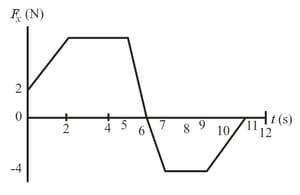
In the figure below shows a box of mass on a frictionless plane inclined at an angle . It is connected by a cord of negligible mass to a box of mass on a horizontal frictionless surface. The pulley is frictionless and massless. If the magnitude of horizontal force , is what is the tension in the connecting cord? What is the largest value the magnitude of may have without the cord becoming slack?
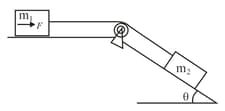
In the figure shown below at wood's machine, in which two containers are connected by a cord (of negligible mass) passing over a frictionless pulley (also of negligible mass). At the time , container has mass and the container has mass , but container is losing mass (through a leak) at a constant rate of . At what rate is the acceleration magnitude of the containers changing at
and When does the acceleration reach its maximum value?
